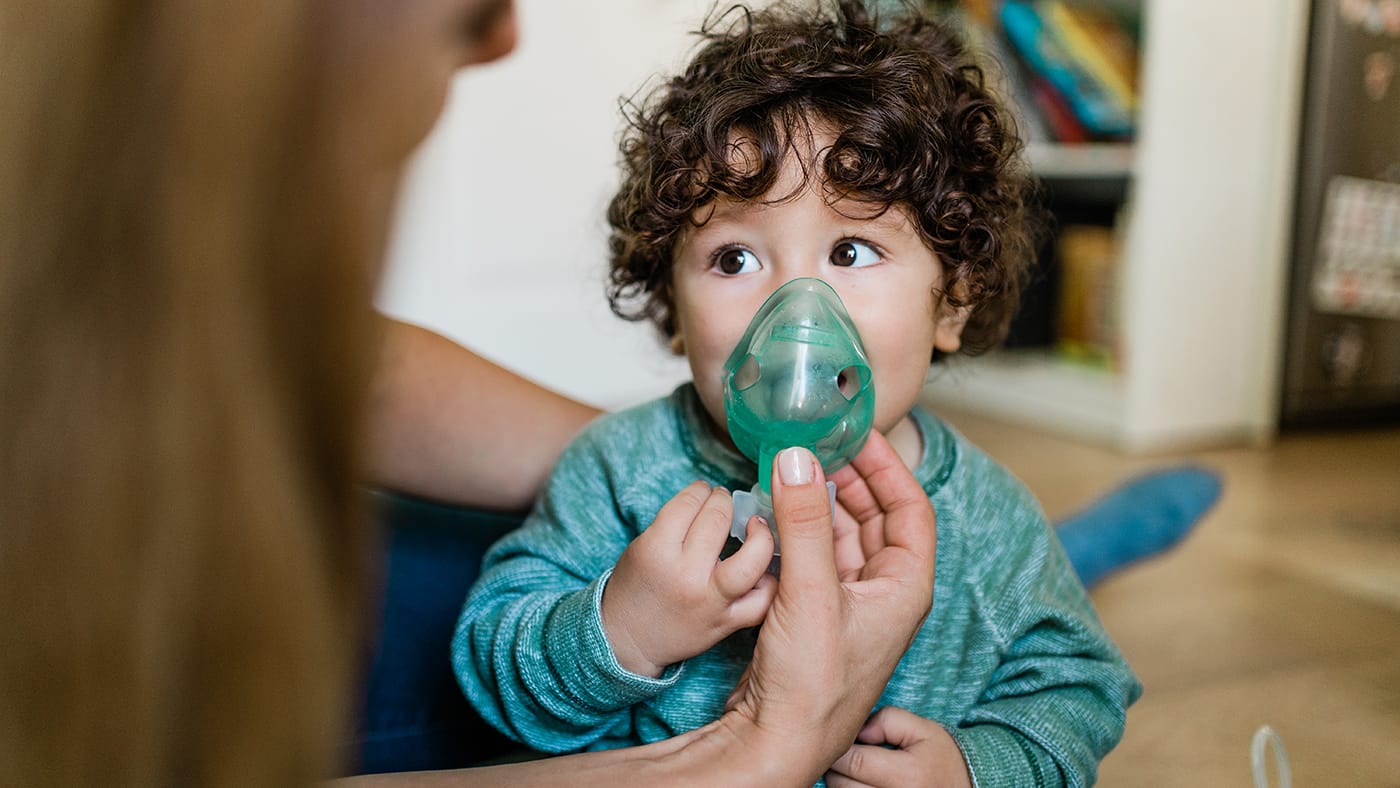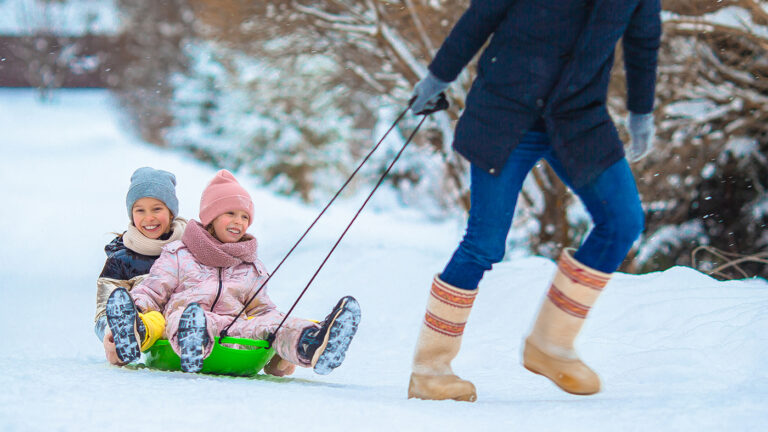For most of us, RSV isn’t something we worry about until we become parents. Then, suddenly, your pediatrician, neighbors, social media, and the local KSL news anchor are all warning about the danger RSV poses to infants. It’s no wonder why new parents might be nervous.
What is RSV, and how do I know if my baby has it?
RSV (respiratory syncytial virus) is a virus that spreads easily and can appear like a common cold. The difference, especially for babies, is the severity of symptoms and the risk RSV poses. Those first symptoms are often identical, with your baby maybe having a runny nose or a slight cough. But for pediatricians and seasoned parents, RSV has some unique markers.
Cold Symptoms vs. RSV Symptoms in Infants
| Symptom | Common Cold | RSV |
| Nasal congestion & runny nose | Very common | Very common |
| Cough | Mild to moderate | Can become deep, wet, or wheezy |
| Fever | Mild or none | Varies from none, to very high. |
| Sneezing, sore throat | Common | Sometimes, but less prominent |
| Wheezing or shortness of breath | Rare | Common in young children; may indicate bronchiolitis |
| Feeding difficulty or lethargy | Rare | Common in infants and can lead to dehydration |
While a cold can come and go within a week, RSV can often devolve into more serious illnesses like bronchiolitis or pneumonia—especially in children under a year old, premature babies, or small children with heart or lung conditions.
How is RSV diagnosed?
Your pediatrician will likely diagnose RSV through an in-person evaluation where they review your child’s symptoms and physical state. Pediatricians look for things like wheezing or crackling sounds in the lungs or other signs your child may be in respiratory distress.
In mild cases, no lab test may be necessary, and your pediatrician can offer you at-home treatments to help ease your child’s symptoms.
However, if your provider needs to confirm your child’s diagnosis (for example, if your baby needs to be hospitalized or the doctor needs to help document an RSV outbreak), there are tests available to confirm an RSV diagnosis:
- Nasopharyngeal swab or suction test:
A small swab is inserted into the nose to collect mucus, which is tested for RSV. - Rapid antigen test:
Gives results within hours. Common in pediatric offices and urgent care clinics. - PCR (Polymerase Chain Reaction) test:
Detects RSV’s genetic material and is highly accurate. It can also check for other viruses at the same time. - Viral culture (rarely used):
Takes several days and is mostly done in research or hospital settings.
Treatment Options for RSV in Children
Depending on the severity of your child’s illness, your pediatrician may send you home with some at-home care instructions to help comfort your child. He or she will also advise you of changes to watch for.
For babies 6 months and younger with mild RSV, treatment focuses on supporting their breathing, hydration, and comfort — since there’s no antiviral medication or cure for RSV itself. Happily, most infants recover at home within 1–2 weeks with attention to these four areas:
1. Keep the Nose Clear
Infants breathe mostly through their noses, so congestion can make it hard for them to feed or sleep.
- Use a saline nasal spray or drops to loosen mucus, then gently suction with a bulb syringe or nasal aspirator before feeding or sleep.
- Run a cool-mist humidifier in the baby’s room to keep the air moist and ease breathing.
2. Support Feeding and Hydration
RSV can make babies too tired or congested to eat well.
- Offer smaller, more frequent feedings of breast milk or formula.
- Watch for signs of dehydration: fewer wet diapers (fewer than 3–4 in 24 hours), dry mouth, or no tears when crying.
- Keep your baby upright during and after feeding to help with congestion.
3. Manage Fever and Discomfort
- Acetaminophen (Tylenol) can be given for fever or discomfort — but only under your pediatrician’s guidance and using correct infant dosing.
- Never give ibuprofen to babies under 6 months old, and don’t give aspirin to a child with a viral illness.
When to Check in with Your Pediatrician
- Your child’s cough is getting worse or sounds deeper or more frequent.
- Breathing is faster than when your child was seen.
- You hear mild wheezing or crackling sounds in the chest.
- Drinking or feeding has dropped noticeably.
- Fever presents or worsens—especially in babies under 2 months.
- Fewer wet diapers or new signs of dehydration like dry lips, sunken soft spot.
- Noticeable fatigue, irritability, or trouble sleeping.
Is it a cold or RSV?
If you’re unsure, book an appointment. With pediatricians at several Salt Lake County and Tooele County locations, we can get your child in same-day.
Call or Text (801) 254-9700
Already a patient? Book online.
| Prevent the Spread RSV is very contagious. If your baby is diagnosed, protect others: – Wash hands often and sanitize frequently touched surfaces. – Avoid close contact with others, especially young children or older adults. – Keep your baby away from crowded places until fully recovered. |
Call 911 or go to the ER immediately if your baby shows these symptoms:
- Breathing is labored (grunting, retractions, flaring nostrils).
- Lips, tongue, or skin look blue or gray.
- Child is very sleepy, limp, or unresponsive.
- Not urinating for 8+ hours or cannot keep fluids down.
What if my child has to be hospitalized for RSV?
If your pediatrician refers you to the hospital, it’s likely because your child will benefit from the additional support to keep them oxygenated and hydrated.
Being told to go immediately to a hospital can be very distressing. However, the hospital setting is perfect for helping your child because they can offer multiple therapies not possible at home or in the pediatric clinic, such as:
Supplemental Oxygen
Hospitals have several ways of ensuring your child has a steady flow of oxygen, depending on their needs:
- Face mask
- High-flow nasal cannula (HFNC)
- Continuous Positive Airway Pressure (CPAP)
- Mechanical ventilation, but only in severe cases.
Fluids & Nutrition
Babies with RSV often struggle to feed because of congestion or fatigue (or both).
- IV fluids can be given for children who are dehydrated or too lethargic to drink.
- Some infants may even receive tube feeding to ensure they get enough calories while they recover.
Monitoring & Observation
Parents, no matter how diligent, are no match for the level of observation a hospital can provide with specialized equipment and staff trained to check for:
- Oxygen levels.
- Pauses in breathing (apnea).
- Secondary infections.
How long will my child be hospitalized with RSV?
Most hospital stays last between 2-5 days, depending on your child’s symptoms and severity. Once your baby can breathe, eat, and maintain their oxygen level, you’ll typically be headed home to finish recovery.
The arrival of cold and flu season understandably makes parents nervous. The good news is, most babies won’t have a serious run-in with RSV. You’re already on the right path just by looking ahead.
Local RSV Resources:
University of Utah Podcast: What to expect if your child gets RSV
Riverton Hospital: Respiratory Care
Utah Department of Health: RSV Prevention in Infants




